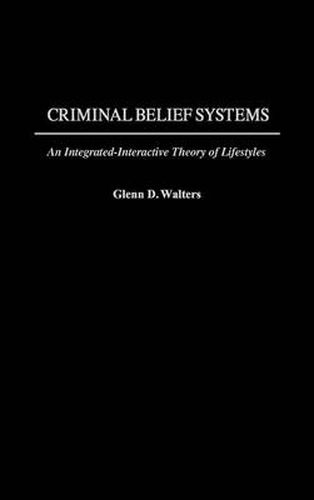Readings Newsletter
Become a Readings Member to make your shopping experience even easier.
Sign in or sign up for free!
You’re not far away from qualifying for FREE standard shipping within Australia
You’ve qualified for FREE standard shipping within Australia
The cart is loading…






Walters integrates information from traditional criminological models and findings from developmental psychology to form a system of five belief systems (self-view, world-view, past-view, present-view, and future-view) designed to explain crime initiation and maintenance. While reviewing belief systems that support crime, Walters also offers a model of change through which belief systems incongruent with crime can be constructed.
He begins with a review of six traditional criminological models, each of which is considered to possess sufficient breadth and substance to advance our understanding of crime. Information gathered from these major theoretical systems is integrated wtih research from developmental psychology to create a system of crime-congruent belief systems. The belief systems, along with recent research on attributions, outcome expectancies, efficacy expectancies, values, goals, and thinking styles, are then used to construct a general theroy of crime and explain four specific categories of crime: violent crime, sexual assault, white-collar crime, and drug tafficking. Walters concludes with a model of assisted change whereby belief systems incongruent with crime are initiated and maintained with the intent of helping people abandon crime-congruent lifestyles. This change model revolves around four core elements-responsibility, confidence, meaning, community-each of which is emphasized in a clinician’s interactions with clients seeking to abandon crime-congruent lifestyles. As Walters maintains, belief systems are instrumental in both the development and cessation of crime-congruent lifestyles. Of particular interest to scholars, students, researchers, and practitioners involved with criminology, criminal justice, and clinical and correctional psychology.
$9.00 standard shipping within Australia
FREE standard shipping within Australia for orders over $100.00
Express & International shipping calculated at checkout
Walters integrates information from traditional criminological models and findings from developmental psychology to form a system of five belief systems (self-view, world-view, past-view, present-view, and future-view) designed to explain crime initiation and maintenance. While reviewing belief systems that support crime, Walters also offers a model of change through which belief systems incongruent with crime can be constructed.
He begins with a review of six traditional criminological models, each of which is considered to possess sufficient breadth and substance to advance our understanding of crime. Information gathered from these major theoretical systems is integrated wtih research from developmental psychology to create a system of crime-congruent belief systems. The belief systems, along with recent research on attributions, outcome expectancies, efficacy expectancies, values, goals, and thinking styles, are then used to construct a general theroy of crime and explain four specific categories of crime: violent crime, sexual assault, white-collar crime, and drug tafficking. Walters concludes with a model of assisted change whereby belief systems incongruent with crime are initiated and maintained with the intent of helping people abandon crime-congruent lifestyles. This change model revolves around four core elements-responsibility, confidence, meaning, community-each of which is emphasized in a clinician’s interactions with clients seeking to abandon crime-congruent lifestyles. As Walters maintains, belief systems are instrumental in both the development and cessation of crime-congruent lifestyles. Of particular interest to scholars, students, researchers, and practitioners involved with criminology, criminal justice, and clinical and correctional psychology.